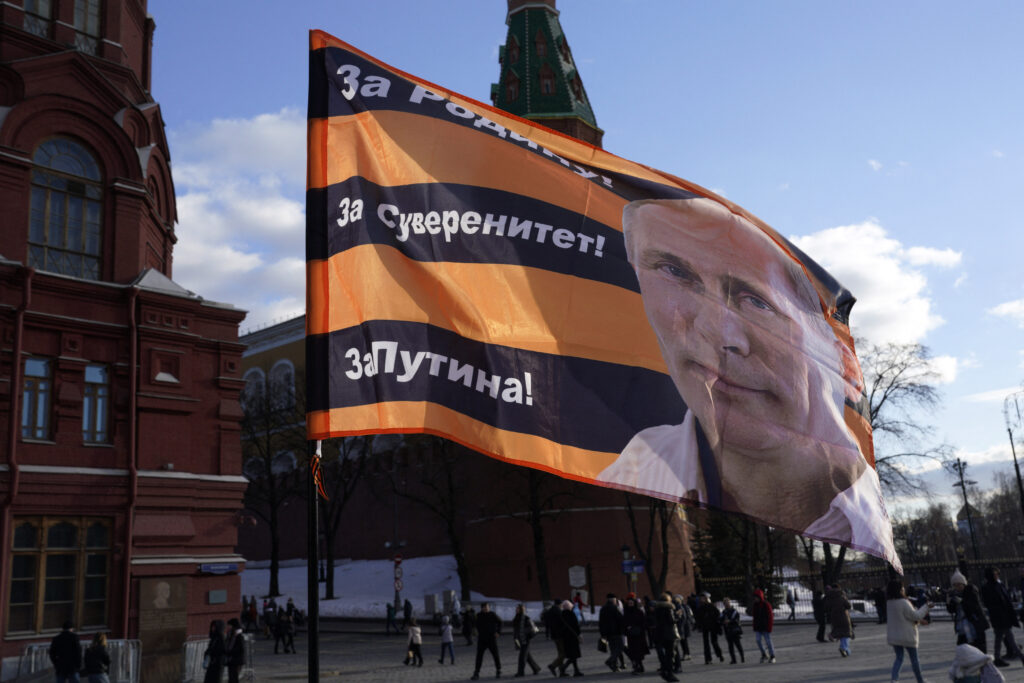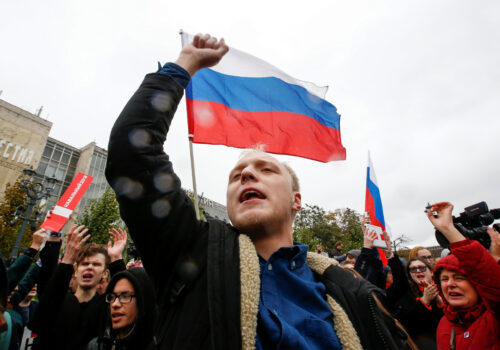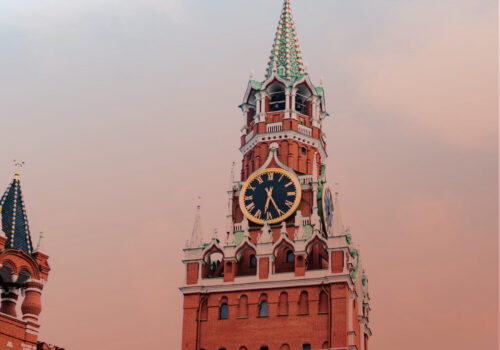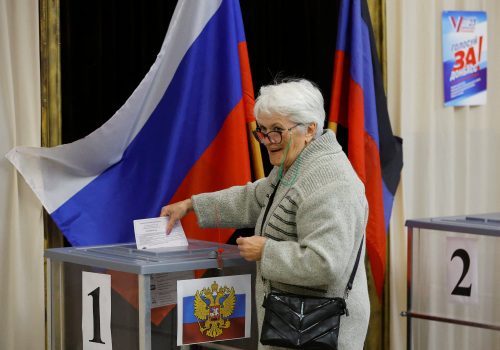Talk long enough and eventually a truth will slip out. “Our presidential election is not really democracy, it is costly bureaucracy,” Kremlin spokesman Dmitry Peskov told the New York Times in August about Russia’s upcoming presidential election. While Russia retains many of the visual markers of democracy—campaign commercials, candidate debates, and election volunteers—Russian elections completely lack the competitive nature of a true democracy. The outcome is not in doubt; Russian President Vladimir Putin will assuredly be reelected following the March 15-17 vote. But there are still aspects of this exercise in “costly bureaucracy” that are worth watching for signs of what to expect next from Putin’s Russia.
How much will Putin ‘win’ by?
Putin and his regime have ensured that this year’s Russian presidential election is a carefully stage-managed affair. There are four candidates who have been allowed on the ballot, including Putin. Putin’s three challengers offer nothing but an unenergetic and unthreatening alternative to the current regime. Despite the multiplicity of parties and candidates, all are handpicked members of the loyal opposition, all support Russia’s deadly war on Ukraine, and none offers a real challenge to Putin.
There are potential opposition candidates, but most are now in prison, in exile, or barred from running. For example, Boris Nadezhdin, a previously pliant politician who then defined his campaign by opposing Russia’s war on Ukraine, was prohibited from appearing on the ballot. Election authorities claimed that there were “irregularities” in the list of signatures he submitted.
Putin has preserved many of the trappings of democracy over his more than two decades in power, but he has entirely hollowed out its contents. Putin is employing the vast resources of the state to guarantee his reelection, while providing a veneer of democracy.
This year is the fifth time Putin has faced the ballot box in a presidential election. No serious observer expresses any doubt as to who will win this election, but doubt remains as to his margin of victory. In 2018, when he faced seven opponents on the ballot, Putin received 77 percent of the vote. Reports indicate that officials are aiming for a record high result for Putin, and Peskov mused in August that “Mr. Putin will be reelected next year with more than 90 percent of the vote.” Will Russian authorities follow through on Peskov’s prediction and finally pull back yet another layer of Russia’s democratic veneer? Such a result wouldn’t reflect the will of the people, but it might better reflect the nature of Putin’s regime, which has become only increasingly authoritarian.
When will Russians vote?
For the first time, voting for the Russian presidential election will be conducted over the course of three days. Russian opposition leader Alexei Navalny, who was prohibited from competing in the 2018 election after his conviction on trumped-up charges and who died in prison just weeks before this year’s election, called on supporters to turn out to vote at a specific time—noon on Sunday, March 17—to show the strength of the opposition to the Kremlin in a way that could not be altered or falsified by authorities. Navalny’s widow, Yulia Navalnaya, repeated the call to supporters after his death.
Navalny’s supporters are no stranger to this kind of quiet activism. When I was in Vladivostok in 2018, I ran into a Navalny supporter outside of a polling place in a residential neighborhood of the city. She wasn’t protesting, but monitoring the conduct of the vote. That activity would be commonplace in a liberal democracy, but in Russia it is dangerously subversive. When I told her I couldn’t answer her poll, she pointedly asked me “What are you afraid of?” She wasn’t afraid of the ramifications of her activism, but clearly knew many fellow Russians who were. For me, it wasn’t fear, but my US citizenship, that prevented me from responding.
The dangers of refusing to play along with the Kremlin’s election theatrics are well-known to all. On March 12, Navalny’s former chief of staff, Leonid Volkov, was the victim of an attack outside his home in Vilnius that Lithuania’s intelligence agency says was likely “Russian organized.” The attackers smashed his car windows, sprayed tear gas inside, and beat Volkov with a hammer.
As was shown during Navalny’s funeral, the mere act of gathering in a manner unsanctioned by the state can be a powerful visual in Russia, even when those gathered lack the banners and signs of a typical protest. Notably, the crowds who coalesced to honor Navalny’s memory chanted anti-Putin and antiwar slogans as they marched to his gravesite. In spite of the risks, might supporters repeat those scenes outside polling places across the country at noon on Sunday?
What turnout will authorities claim?
In the lead-up to the election and over the course of the three days of voting, officials throughout the Russian Federation will go to great lengths to boost turnout. Regional leaders have good reason to put in the extra effort, as they will have to provide explanations to Moscow if their region’s turnout falls short.
In past elections, authorities have attempted to instill confidence in the process by livestreaming the voting and vote-counting process in polling places across the country. Widespread irregularities reported in past Russian elections confirm that any such confidence is misplaced. And now, the introduction of online voting has provided authorities with an additional tool to manipulate turnout figures.
How will the world react?
Despite the lack of any real competition or debate about Putin’s policies, Russia’s full-scale invasion of Ukraine looms large over this election. In a move decried by Kyiv and its international partners, Russia will conduct elections in the regions it occupies and illegally claims to have annexed in Ukraine. The vote is widely viewed as a test of Putin’s total control over Russian society and of his ability to mobilize the country to redouble Russia’s war effort against Ukraine. Left unchallenged, Putin will be emboldened to pursue his goals not only domestically, but also against Ukraine and across the globe.
It can be expected that Putin’s coterie of authoritarian allies will congratulate him on his reelection, but the degree to which other global leaders denounce the results or stay silent will be an important barometer of their countries’ attitude toward Moscow. In 2011, then US Secretary of State Hillary Clinton famously cited “serious concerns” after the Russian parliamentary elections of that year. In 2012, President Barack Obama called to congratulate Putin on his reelection, as did President Donald Trump in 2018. It’s unlikely that such a call will be repeated between President Joe Biden and Putin in 2024, but the example Washington sets in denouncing the results will be an important element to watch as other governments react.
Will there be any signs of protest?
While these elections might share a passing resemblance to the litany of elections that will be held in 2024 in the world’s established liberal democracies, Putin’s presidential election will not share any of the true elements that make those elections free and fair.
Elections reflect how modern regimes exist only through the consent of the governed. In authoritarian regimes, rigged elections are a stark reminder of how that consent is coerced. Putin surely remembers the protests that erupted in Serbia after a rigged election in 2000, in Georgia in 2003, and in Belarus in 2020. He will also recall the protests that erupted at home in 2011 after the fraudulent Russian parliamentary elections of that year. Amid Russia’s war on Ukraine, Putin and his regime are pulling out all the stops to avoid a repeat of that history. The measure of their success will be the silence of the streets.
Benton Coblentz is a program assistant with the Atlantic Council’s Eurasia Center.
Further reading
Fri, Feb 16, 2024
Russia’s democracy movement will survive the death of Navalny
New Atlanticist By Dylan Myles-Primakoff
The strategies and messages that the late opposition leader developed for fighting the Putin regime have spread to a diverse group of Russian pro-democracy actors.
Fri, Feb 2, 2024
Russia Tomorrow: Five scenarios for Russia’s future
Russia Tomorrow By
A new Atlantic Council report explores five paths that Russia future might take in its future. What forces will shape Russia’s future?
Tue, Sep 12, 2023
Russia seeks to legitimize occupation of Ukraine with sham elections
UkraineAlert By
In early September, Russia staged sham parliamentary elections in occupied regions of southern and eastern Ukraine as Moscow attempted to legitimize its earlier illegal annexation of five Ukrainian provinces.
Image: A flag-banner with Putin's portrait is seen outside Moscow Kremlin one week ahead of the Presidential elections in Russia, March 9, 2024. The text in Russian reads as "For the Fatherland, for the independence, for Putin". Photo by Yuri Gripas/ABACAPRESS.



